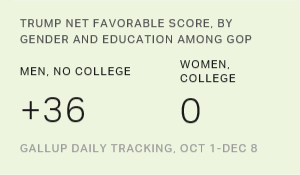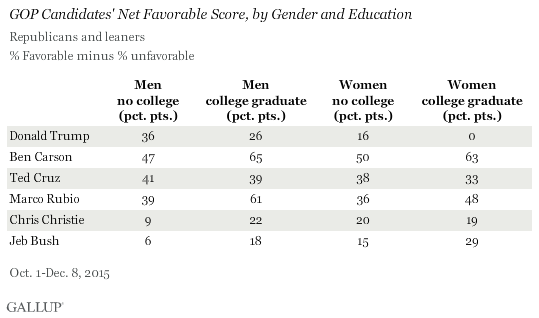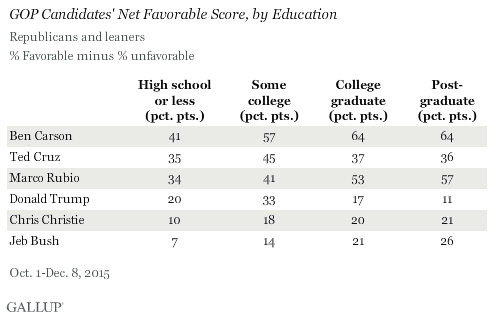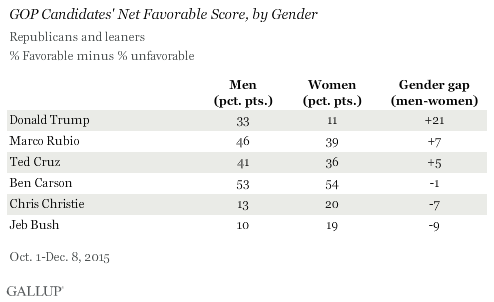Donald Trump has an unusually strong appeal to blue-collar male Republicans, a group among whom his image is much more positive than among GOP men with a college degree or among Republican women regardless of their education. Ted Cruz also skews slightly more positively among blue-collar male Republicans, while Ben Carson, Marco Rubio, Chris Christie and Jeb Bush do better among men with a college education than among those without.

The accompanying table shows the net favorable score for these six GOP candidates, using a large sample of Republican and Republican-leaning independents interviewed Oct. 1-Dec. 8.
It's hard to define "blue collar" accurately, but for these purposes, I divided the sample into those with a college degree and those without.

One thing is clear and reinforces a key point -- Trump is not all that popular among Republicans in general, despite the fact that he manages to win the myriad trial-heat ballot measures appearing in the press on a daily basis.
Note that even among men with no college education, Trump comes in fourth behind Carson, Cruz and Rubio, and among the other three segments he does less well, including having the worst image of any of these six candidates among women with a college degree. In fact, Trump's net favorable rating among college-educated GOP women is by far the lowest of any candidate among any of these four groups. Of these six candidates, Trump's image is fourth-highest among blue-collar men, fourth among college-educated men, fifth among blue-collar women and sixth among college-educated women.
But on a relative basis, Trump's skew toward less-educated GOP men is clear. His +36 net favorable score among this group is 10 points higher than among Republican men with a college degree and higher than among women (particularly the aforementioned college-educated women). Cruz has a two-point advantage among blue-collar men compared with college-educated men, while the other four candidates' images skew more positively among GOP men with a college degree, including a 22-point gap in that direction for Rubio. (I didn't include the data in this analysis, but when we isolate just the 85% of Republicans who are non-Hispanic white, Trump's relative appeal to blue-collar men is even stronger.)
We can look in a little more detail at the image of these six candidates using a more refined measure of education. Here we see that Trump has his highest appeal to Republicans with some college education but with no degree. He shares this pattern -- again -- with Ted Cruz, while the other four candidates' images get more positive as education increases.

The candidates with the highest appeal to the best-educated Republicans are Carson and Rubio. Carson's net favorable rating of +64 among this group, and Rubio's +57, can be contrasted with Trump's +11, the worst of any of the six candidates. Trump also has the worst net favorable rating among Republicans with a college degree but no postgraduate education. In short, despite having graduated from the Ivy League University of Pennsylvania (although not, as is sometimes claimed, at the top of his class), his appeal skews decidedly toward those Republicans who did not graduate from college at all.
Finally, to provide a little more precise data on Trump's image that we show in the first table above, the accompanying simplified table shows the net favorable score of each of the candidates by gender.

Here, Trump's strong relative appeal to male Republicans is clear; his 21-point gender gap is by far the biggest of any of these candidates. Rubio and Cruz have a much less pronounced skew toward GOP men, while the positive images of Carson, Christie and Bush skew modestly toward women.
In sum, Trump is not that popular in general among Republicans, but has a particular image problem among women and those with college and postgraduate degrees. Looking at this from a different angle, Trump clearly has his greatest appeal to Republican men -- and, in particular, to Republican men without a college degree.